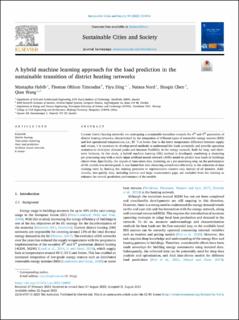| dc.contributor.author | Habib, Mustapha | |
| dc.contributor.author | Timoudas, Thomas Ohlson | |
| dc.contributor.author | Ding, Yiyu | |
| dc.contributor.author | Nord, Natasa | |
| dc.contributor.author | Chen, Shuqin | |
| dc.contributor.author | Wang, Qian | |
| dc.date.accessioned | 2024-03-15T12:47:14Z | |
| dc.date.available | 2024-03-15T12:47:14Z | |
| dc.date.created | 2023-09-08T13:08:14Z | |
| dc.date.issued | 2023 | |
| dc.identifier.citation | Sustainable Cities and Society (SCS). 2023, 99 . | en_US |
| dc.identifier.issn | 2210-6707 | |
| dc.identifier.uri | https://hdl.handle.net/11250/3122668 | |
| dc.description.abstract | Current district heating networks are undergoing a sustainable transition towards the 4th and 5th generation of district heating networks, characterized by the integration of different types of renewable energy sources (RES) and low operational temperatures, i.e., 55 °C or lower. Due to the lower temperature difference between supply and return, it is necessary to develop novel methods to understand the loads accurately and provide operation scenarios to anticipate demand peaks and increase flexibility in the energy network, both for long- and short-term horizons. In this study, a hybrid machine-learning (ML) method is developed, combining a clustering pre-processing step with a multi-input artificial neural network (ANN) model to predict heat loads in buildings cluster-wise. Specifically, the impact of time-series data clustering, as a pre-processing step, on the performance of ML models was investigated. It was found that data clustering contributes effectively to the reduction of data training costs by limiting the training processes to representative clusters only instead of all datasets. Additionally, low-quality data, including outliers and large measurement gaps, are excluded from the training to enhance the overall prediction performance of the models. | en_US |
| dc.language.iso | eng | en_US |
| dc.publisher | Elsevier | en_US |
| dc.rights | Navngivelse 4.0 Internasjonal | * |
| dc.rights.uri | http://creativecommons.org/licenses/by/4.0/deed.no | * |
| dc.title | A hybrid machine learning approach for the load prediction in the sustainable transition of district heating networks | en_US |
| dc.title.alternative | A hybrid machine learning approach for the load prediction in the sustainable transition of district heating networks | en_US |
| dc.type | Peer reviewed | en_US |
| dc.type | Journal article | en_US |
| dc.description.version | publishedVersion | en_US |
| dc.source.pagenumber | 14 | en_US |
| dc.source.volume | 99 | en_US |
| dc.source.journal | Sustainable Cities and Society (SCS) | en_US |
| dc.identifier.doi | 10.1016/j.scs.2023.104892 | |
| dc.identifier.cristin | 2173514 | |
| cristin.ispublished | true | |
| cristin.fulltext | postprint | |
| cristin.qualitycode | 1 | |

